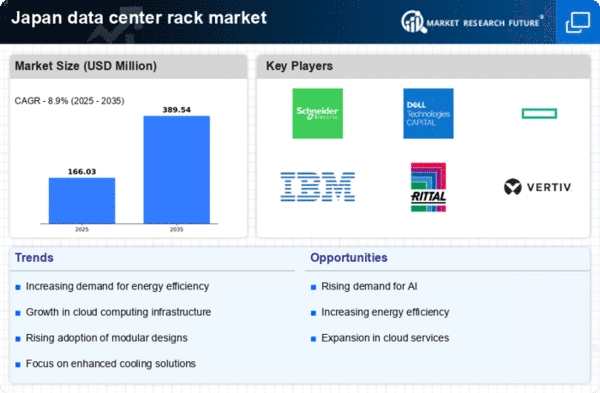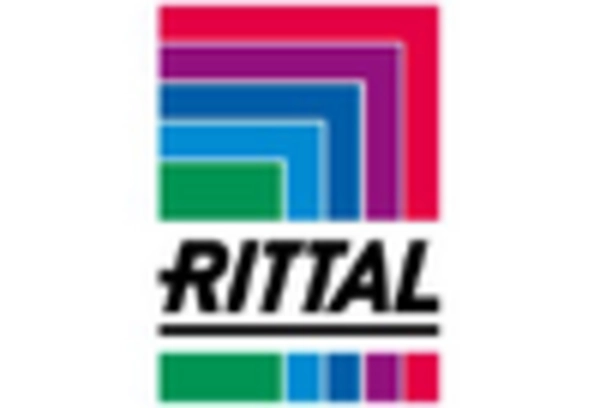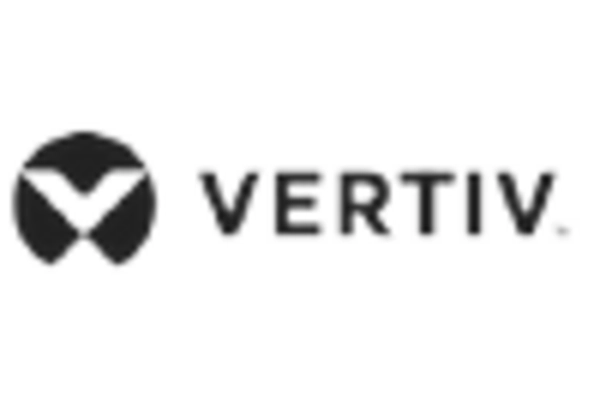Rise of Edge Computing Solutions
The emergence of edge computing is reshaping the landscape of the data center-rack market in Japan. As organizations seek to process data closer to the source, the need for localized data centers equipped with efficient rack solutions becomes evident. This trend is particularly pronounced in sectors such as manufacturing and telecommunications, where real-time data processing is critical. The data center-rack market is expected to benefit from this shift, as companies invest in racks that support edge computing architectures. With the anticipated growth of IoT devices and applications, the demand for compact and high-performance racks is likely to increase, further propelling the data center-rack market in Japan.
Surge in Cloud Computing Adoption
The data center-rack market in Japan experiences a notable surge due to the increasing adoption of cloud computing services. As businesses transition to cloud-based solutions, the demand for efficient and scalable data center infrastructure rises. This shift necessitates advanced rack solutions that can accommodate high-density servers and storage systems. According to recent data, the cloud computing sector in Japan is projected to grow at a CAGR of approximately 20% over the next five years. This growth directly influences the data center-rack market, as providers seek to optimize their facilities to support the expanding cloud ecosystem. Consequently, the need for innovative rack designs that enhance space utilization and cooling efficiency becomes paramount, driving investments in the data center-rack market.
Regulatory Compliance and Data Security
In Japan, stringent regulatory frameworks regarding data security and privacy significantly impact the data center-rack market. Organizations are compelled to invest in infrastructure that not only meets compliance standards but also ensures the protection of sensitive information. The Personal Information Protection Act (PIPA) mandates strict guidelines for data handling, prompting companies to enhance their data center capabilities. This regulatory environment drives the demand for specialized racks that facilitate secure data storage and management. As businesses strive to align with these regulations, the data center-rack market is likely to see an increase in demand for racks equipped with advanced security features, such as biometric access controls and enhanced monitoring systems.
Technological Advancements in Cooling Solutions
Technological advancements in cooling solutions are playing a pivotal role in the evolution of the data center-rack market in Japan. As data centers strive for energy efficiency, innovative cooling technologies, such as liquid cooling and advanced airflow management systems, are gaining traction. These solutions not only enhance the performance of high-density racks but also contribute to significant energy savings. Reports indicate that energy costs account for a substantial portion of data center operational expenses, prompting operators to seek out more efficient cooling methods. The integration of these advanced cooling technologies is likely to drive growth in the data center-rack market, as companies prioritize sustainability and operational efficiency.
Increased Investment in Data Center Infrastructure
The data center-rack market in Japan is witnessing increased investment in infrastructure development, driven by the growing demand for digital services. As businesses expand their online presence, the need for robust data center facilities becomes critical. This trend is reflected in the rising capital expenditures allocated to data center construction and upgrades. Recent statistics suggest that investments in data center infrastructure in Japan are expected to reach approximately $10 billion by 2026. This influx of capital is likely to stimulate the data center-rack market, as operators seek to enhance their facilities with state-of-the-art racks that support higher performance and reliability. The focus on infrastructure development is anticipated to create a favorable environment for the growth of the data center-rack market.
















